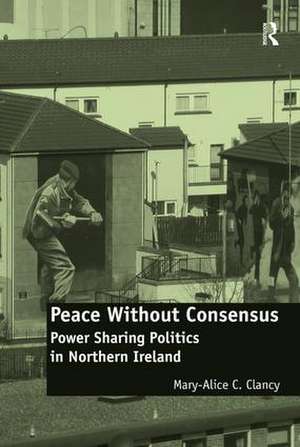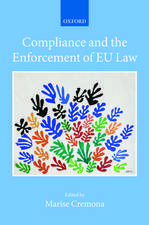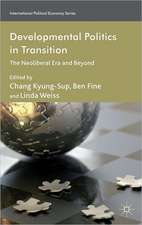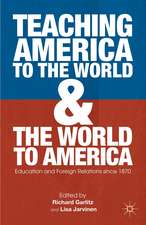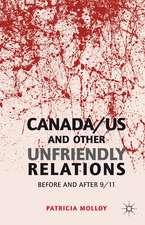Peace Without Consensus: Power Sharing Politics in Northern Ireland
Autor Mary-Alice C. Clancyen Limba Engleză Hardback – 28 iul 2010
Preț: 1005.04 lei
Preț vechi: 1225.65 lei
-18% Nou
Puncte Express: 1508
Preț estimativ în valută:
192.32€ • 205.65$ • 160.35£
192.32€ • 205.65$ • 160.35£
Carte tipărită la comandă
Livrare economică 18 aprilie-02 mai
Preluare comenzi: 021 569.72.76
Specificații
ISBN-13: 9780754678311
ISBN-10: 0754678318
Pagini: 232
Dimensiuni: 156 x 234 x 14 mm
Greutate: 0.59 kg
Ediția:1
Editura: Taylor & Francis
Colecția Routledge
Locul publicării:Oxford, United Kingdom
ISBN-10: 0754678318
Pagini: 232
Dimensiuni: 156 x 234 x 14 mm
Greutate: 0.59 kg
Ediția:1
Editura: Taylor & Francis
Colecția Routledge
Locul publicării:Oxford, United Kingdom
Notă biografică
Mary-Alice C. Clancy, Research Fellow, Centre for Ethno-Political Studies, University of Exeter, UK
Recenzii
'Mary-Alice Clancy advances a thesis, backed up with facts and interviews, that is highly revelatory. Contrary to the official narrative of the Irish peace process, it was George W Bush's administration that propelled forward negotiations leading to the final power sharing settlement Northern Ireland enjoys. Rather than be a slave to the orthodoxy of the peace process Clancy came to an important conclusion - it was pressure from the Bush White House that forced Sinn Fein to support the police and thus pave the way for Irish republicans to share power with their former unionist enemies. To argue that it was Bush rather than the Clintons who created the conditions for endgame in Ulster is an intellectually courageous enterprise.' Henry McDonald,The Observer, UK 'This valuable and original book underscores the importance of the American dimension to the politics of Northern Ireland. The story of the contribution of the Clinton Administration to the peace process and the Good Friday Agreement is well known. Uncovered by Dr Clancy in a powerful piece of research is a previously untold account of the role that the Administration of George W. Bush played in the consolidation of the peace through the St Andrews Agreement. Anyone interested in American mediation or Irish politics will find this book fascinating.' Adrian Guelke, Queen's University Belfast, UK ’Peace Without Consensus is a carefully researched academic work whose readability is enhanced by a journalistic flair... there is much that is controversial in his book, but there is far more to recommend it as a well-informed and balanced analysis of the roles played by external actors in post-conflict Northern Ireland.’ British Politics Group Quarterly
Cuprins
List of Abbreviations; Foreword; Acknowledgments; Introduction; Chapter 1 The Formation of Northern Ireland, Ethno-Nationalism and Consociationalism; Chapter 2 The ‘High Politics’ of the Sunningdale and Anglo–Irish Agreements; Chapter 3 An Agreed Approach? The ‘High Politics’ of the Belfast Agreement; Chapter 4 Saving Dave? The High Politics of the Post-Agreement Period, 1998–2000; Chapter 5 All Changed, All Changed Utterly? September 11th and Beyond; Chapter 6 ‘You never hit a homerun with these things; sometimes you just get a walk’ Northern Ireland, 2004–2007; Chapter 7 Conclusion;
Descriere
Peace Without Consensus explores the contribution of the US, British and Irish governments to the electoral triumph of Sinn Féin and the Democratic Unionist Party in 2003. Profiled in the Guardian, the Observer, BBC Radio Four, the Irish Independent and Henry McDonald's 'Gunsmoke and Mirrors', the book offers salient lessons for regions embroiled in conflict and should be read by all those interested in Northern Ireland's peace process and US foreign policy.
